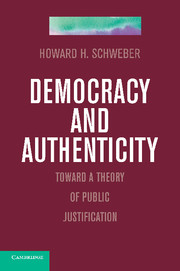Book contents
- Frontmatter
- Contents
- 1 Introduction
- Part One The Case for Constraint
- Part Two Responding to the Case for Inclusion
- 7 Arguments from Consequences
- 8 Further Arguments from Consequences
- 9 Fairness as Equality
- 10 Fairness as Recognition
- 11 The Argument from Epistemology
- 12 Empiricism and Public Justification
- 13 Toward a Theory of Public Justification
- Bibliography
- Index
- References
9 - Fairness as Equality
from Part Two - Responding to the Case for Inclusion
Published online by Cambridge University Press: 05 November 2011
- Frontmatter
- Contents
- 1 Introduction
- Part One The Case for Constraint
- Part Two Responding to the Case for Inclusion
- 7 Arguments from Consequences
- 8 Further Arguments from Consequences
- 9 Fairness as Equality
- 10 Fairness as Recognition
- 11 The Argument from Epistemology
- 12 Empiricism and Public Justification
- 13 Toward a Theory of Public Justification
- Bibliography
- Index
- References
Summary
The argument from fairness is central to the case for constraint that was presented in Part One of this book. In that discussion, I argued that in order to be consistent with the demands of fairness, a properly conceived theory must focus on the unwilling listener rather than the constrained speaker and employ objective rather than subjective standards of evaluation. Predictably, the argument from fairness in favor of inclusion tends to take the opposite tack on both questions, focusing on the alleged unfairness to the constrained speaker and on the subjective experience of the constraints of public justification. Likewise, where I argued that concerns of fairness should lead liberal thinkers to abandon the claims of authenticity, the case for inclusion frequently asserts that fairness requires either permitting or requiring authenticity to be an element of democratic politics.
In this chapter and Chapter 10, I revisit the arguments from fairness, this time in the form of a speaker-oriented, subjectivist case for inclusion and the related appeal for a foundational commitment to authenticity. These same questions were visited in the last two chapters in terms of arguments from consequences. In that discussion, the point was that the inclusion of religious justifications and appeals to the politics of authenticity present the combined dangers of domination and division. In this discussion, my argument will be that when inclusion and authenticity are made elements of fairness, the result is a paradoxical outcome in which appeals to fairness become the basis for removing all limitations on what the proponents of inclusion themselves concede is manifest unfairness.
- Type
- Chapter
- Information
- Democracy and AuthenticityToward a Theory of Public Justification, pp. 268 - 300Publisher: Cambridge University PressPrint publication year: 2011

